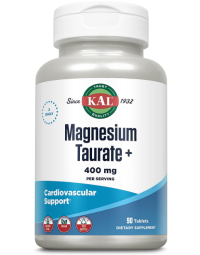Magnesium is an essential mineral that plays a crucial role in various bodily functions. It is involved in over 300 enzymatic reactions and is fundamental for maintaining good health. Magnesium supports various aspects of our body’s functioning, including muscle and nerve function, energy production, and DNA synthesis. It also helps maintain healthy bones and teeth and promotes a healthy cardiovascular system.
Understanding the Types of Magnesium
There are several different types of magnesium, each with distinct properties and benefits. Understanding these types can help you choose the right magnesium supplement for your needs.
1. Magnesium Threonate: This form of magnesium has shown promise in supporting brain health and cognitive function. Research suggests that magnesium threonate can cross the blood-brain barrier due to its higher bioavailability compared to other forms of magnesium. This increased ability to reach the brain may contribute to its potential to support memory, learning, and overall cognitive performance.
2. Magnesium Taurate: Magnesium taurate is a unique form of magnesium that is bonded to the amino acid taurine. This combination is known for its calming effect on the nervous system, making it beneficial for stress relief and promoting relaxation. In addition to its relaxation properties, it also supports cardiovascular health and helps maintain healthy blood pressure levels.
3. Magnesium Citrate: This highly bioavailable form of magnesium is derived from citric acid found in fruits and vegetables. It is known for its ability to promote digestive health. It can help relieve constipation by drawing water into the intestines, supporting optimal bowel movements.
4. Magnesium Glycinate: Formed from the amino acid glycine, magnesium glycinate is highly absorbable and gentle on the stomach, making it an excellent choice for those with digestive sensitivities. This form of magnesium is particularly beneficial for promoting relaxation and supporting a healthy sleep cycle.
5. Magnesium Malate: Derived from malic acid, this type of magnesium is known for supporting energy production and muscle function. It is often used by athletes and those looking to enhance physical performance. Magnesium malate is unique because it combines the benefits of magnesium with the added advantage of malic acid, which plays a crucial role in the production of ATP, the body’s primary energy molecule.
6. Magnesium Oxide: Derived from magnesium salts, magnesium oxide is commonly used in supplements. It has a high magnesium content but lower bioavailability, meaning it is not as easily absorbed by the body. While it may not be as readily absorbed as other forms of magnesium, it can still provide benefits for those looking to increase their magnesium intake.


Common Uses and Benefits of Magnesium
Promoting Relaxation and Better Sleep: One common use of magnesium is its ability to promote relaxation and improve sleep quality. Magnesium helps regulate neurotransmitters in the brain, such as GABA, which are responsible for calming the nervous system. By promoting relaxation, magnesium can help you achieve a restful night's sleep.
Supporting Bone Health and Preventing Osteoporosis: Magnesium is vital for maintaining strong and healthy bones. It works in conjunction with other minerals, such as calcium and vitamin D, to support bone density. Furthermore, magnesium helps regulate calcium absorption.
Aiding Digestion and Relieving Constipation: Magnesium plays a crucial role in digestion. It helps relax the muscles in the digestive tract, allowing for smoother movement of food through the intestines. This can help relieve constipation and promote regular bowel movements. Additionally, magnesium aids in the production of digestive enzymes, which are essential for proper digestion and nutrient absorption.
Relieving Muscle Cramps and Spasms: One of the primary benefits of magnesium is its ability to support the relief of muscle cramps and spasms. Whether it's a result of intense exercise or a deficiency in magnesium, these painful muscle contractions can be debilitating. By supplementing with magnesium, you can help relax the muscles and alleviate cramping, allowing for greater comfort and mobility.
Reducing Muscle Soreness and Fatigue: After an intense workout, your muscles may feel sore and fatigued due to the buildup of lactic acid. Magnesium helps regulate lactic acid levels, allowing for faster recovery and minimizing post-exercise soreness.
As you can see, the different types of magnesium offer a range of benefits for your overall health and well-being. Whether you're looking to improve your sleep quality, support your bone health, or aid digestion, incorporating magnesium-rich foods or supplements into your routine can be beneficial. Consult with a healthcare professional to determine the best type and dosage of magnesium for your specific needs.














